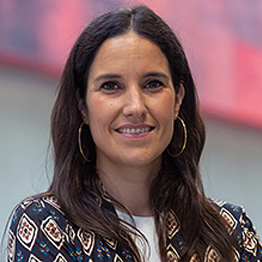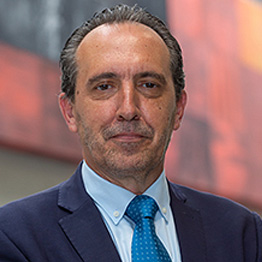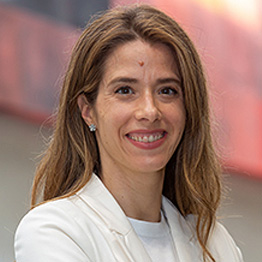The Marketing and Media Management Department of the School of Communication of the University of Navarra focuses its teaching and research on the intersection between marketing, communication and media. Its core areas of work are marketing, institutional communication, and media Economics and management .
The purpose of department is to work in these three areas with a approach multidisciplinary . As far as marketing is concerned, starting from the essential foundations of discipline, work is done especially in areas core topic such as research of markets, development of strategies, management of brands, and assessment and measurement of results. In the field of communication, approach is directed towards public relations, crisis management and strategic communication. In the field of media Economics and management , where department was originally created, aspects of management of communication companies and analysis of markets and media consumption are addressed.
The teaching on these topics depends on department in the Degrees of Marketing, Journalism and Audiovisual Communication, and in the programs of postgraduate program Master's Degree Executive in management of Communication Companies (MEGEC) and Master's Degree in Political and Corporate Communication (MCPC).
The history of department dates back to its creation in 1976 as department of business Informative and Information Structure. Its founder and first director was Professor Alfonso Nieto, teacher of many of the current professors of department, and inspirer of the approach professor and researcher that has been maintained to the present.
Research activity

|
Title |
PhD Student |
Date |
Director |
|
Minors and influencer marketing: advertising literacy in the face of new persuasive formats in social networks. |
Zozaya Durazo, Luisa |
4/07/2023 |
Charo Sádaba Chalezquer |
|
framework reputation. Implications for university governance |
Fernández-Gubieda Lacalle, Santiago |
2/03/2023 |
Elena Gutiérrez García |
|
The management of corporate branding in the Spanish audiovisual sector |
Pereira Villazón, Tatiana |
21/12/2022 |
Idoia Portilla Manjón |
|
Digital literacy: a multidimensional view of digital competencies in 21st century skills frameworks |
Martínez Bravo, Mª Cristina |
20/12/2022 |
Charo Sádaba Chalezquer |
|
Globalised Online News: The Role of Digital Intermediaries in the average Value Chain". |
González Tosat, Clara |
23/11/2022 |
Charo Sádaba Chalezquer |
|
Communication and open innovation: an internal corporate perspective |
Yáñez Galdames, Mª Jesús |
20/06/2022 |
Elena Gutiérrez García |
|
Dimensions of management of journalistic branding from the perspective of audiences: a comparative analysis. |
Burguera Pérez. Mª Ángeles |
22/09/2021 |
Alfonso Vara Miguel |
|
Contribution of public and institutional policies to the research developed in Ecuadorian universities with programs of study in communication. |
Calva Cabrera, Ketty Daniela |
25/06/2021 |
Idoia Portilla Manjón |
|
proposal of a comprehensive accommodative leadership model (ALF) for the development of multicultural high performing teams. |
Zambonino Vázquez, Francisco Javier |
21/12/2020 |
Alfonso Vara Miguel |
|
The impact of digital transformation on companies: a survey of managers and employees. |
Foncillas Díaz-Plaja, Pablo |
10/12/2020 |
Fco. Javier Pérez Latre |
|
Adaptation as a survival mode in a market at training. The case of elmundo.es 1996-2020. |
Sangil Santamaria, Luis |
2/11/2020 |
Alfonso Sánchez-Tabernero |
|
Strategic Importance of Internal Communication in Nigerian Fast Moving Consumer Goods (FMCG) Companies Management |
Okolo, Michael |
18/09/2020 |
Fco. Javier Pérez Latre |
|
Misand Disinformation online: a Taxonomy of Solutions |
Stiglitz, Anya |
16/07/2020 |
Ángel Arrese Reca |
|
The role of Thinks Tanks as average diary Setters: The Spanish Case at U.S. Press (1999-2013) |
Paro Naredo, Pablo |
2/07/2020 |
Alfonso Vara Miguel |
|
Environmental influences in the pre-university decision process: the case of the University of Navarra. |
Fernández Torregrosa, Antonio María |
25/06/2020 |
Ángel Arrese Reca |
|
The use of social networks for brand reputation: The case of Antena 3 Noticias management |
Benguría Aguirreche, Jaime |
27/02/2020 |
Alfonso Sánchez Tabernero |
|
development and validation of a scale to measure the quality of television products |
Kimber Camussetti, David Israel |
22/02/2019 |
Mercedes Medina Laverón |
|
Innovation and Commercial Communication: an integrative conceptual approach. |
Sanz Llopis, Jorge Juan |
3/10/2017 |
Xavier Bringué conference room |
|
The engagement relationship in on-demand television. The case of Netflix Spain |
Urgellés Molina, Alicia |
8/09/2017 |
Mónica Herrero Subías |
|
Engagement and television audiences in Colombia: proposal of a qualitative analysis model |
González Bernal, Manuel Ignacio |
12/12/2016 |
Xavier Bringué Sala |
|
Business models for the press on the Internet. The case of The Wall Street Journal |
Díaz Espina, Carolina |
19/09/2016 |
Alfonso Vara |
|
The impact of mobile-mediated communication on adolescents' social relationships. |
Vidales Bolaños, Mª José |
29/06/2016 |
Charo Sádaba Chalezquer |
|
The digital transformation of the agency of advertising. Analysis of the Spanish case |
Kaufmann Argueta, Jürg |
13/06/2016 |
Ángel Arrese Reca |
|
Relational segmentation |
Baiocchi, Reynaldo Gustavo |
22/01/2016 |
Francisco Javier Pérez Latre |
|
The process of Institutional Communication in the Catholic Church. Content analysis of the messages in press during WYD Madrid 2011. |
Vera BeorleguiI, José Gabriel |
18/01/2016 |
Natalia Rodríguez Salcedo |
|
The affinity index as a measure of television news quality |
López Sanz, Mª Eugenia |
17/12/2015 |
Mercedes Medina Laverón |
|
The business in the public sphere: management communicative of its political dimension |
Piñera Camacho, Alejandra |
6/03/2015 |
Elena Gutiérrez García |
|
Reputation measurement in the online environment. Feasibility study on social networks Facebook and Twitter. |
Itoiz López, Maite |
22/12/2014 |
Idoia Portilla |
|
The museum as a social institution: the communication process as tool for the reconstruction of communities. |
Cordón Benito, David |
26/09/2014 |
Natalia Rodríguez Salcedo |
|
Contribution of visual merchandising to the communication of fashion brand identity in retailing |
Llovet Rodríguez, Carmen |
27/03/2014 |
Charo Sádaba Chalezquer |
|
Communicative dimension of business. Analysis applied to the telecommunications sector |
Recalde Viana, Mónica |
17/06/2013 |
Elena Gutiérrez García |
|
The organization around brands as a competitive advantage: the case of Unity publishing house |
García-Mansilla, Gustavo |
9/05/2013 |
Alfonso Sánchez-Tabernero |
Departmental management committee
Teaching

From department depends the teaching on the mentioned topics in the Degrees Marketing, Journalism and Audiovisual Communication, and in the programs of postgraduate program Master's Degree Executive in management of Communication Companies (MEGEC) and Master's Degree in Political and Corporate Communication (MCPC).
Boarding students

A student intern is a student who joins department to collaborate in tasks of teaching and/or research, performing tasks that are compatible with their dedication to study and that contribute to their academic and professional training . Therefore, being student intern means participating in the university work , collaborating in the professor and research activity of the professors of the School of Communication.
Being student intern is an opportunity to acquire a solid and complete university training , as it provides an experience that allows acquiring or developing some of the skills, aptitudes and attitudes necessary to work with skill professionally. At the same time, having contact with the teaching and research tasks of the Departments is an opportunity to get to know from the inside the work that is carried out in the School and can be the entrance gateway to the degree program academic .










